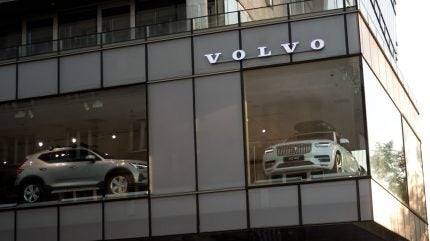
Geely-owned Volvo Cars has reported a significant loss for the second quarter (Q2) of 2025, with a group operating profit (EBIT) down by Skr10.0bn ($1.02bn) compared to Skr8.0bn in Q2 2024, reflecting ongoing challenges within the automotive industry.
Despite this, the company said that its Skr18bn ($1.84bn) cost and cash turnaround plan is progressing as expected, with full effects anticipated in 2026.

Discover B2B Marketing That Performs
Combine business intelligence and editorial excellence to reach engaged professionals across 36 leading media platforms.
Q2 revenues fell to Skr93.5bn from Skr101.5bn reported in the same period of the previous year, and the EBIT margin dropped from 7.9% to -10.6%.
The Q2 EBIT includes items affecting comparability of Skr12.9bn, comprising an impairment of Skr11.4bn and a Skr1.4bn restructuring charge. Excluding these items, the EBIT was Skr2.9bn, with an EBIT margin of 3.1%.
The impairment charge was attributed to the adjustment of “financial assumptions for the EX90 and ES90 platform”, import tariffs, and delays for the EX90.
Additionally, a one-time restructuring cost of Skr1.4bn was linked to a decrease of 3,000 headcounts.
Retail sales also experienced a decline, with 181,600 cars sold in Q2, a 12% decrease from the same period last year.
The Skr18bn turnaround plan, introduced in early 2025, is already having an impact, with the reduction of 3,000 positions underway, and nearly 1,100 employees having left the company.
Volvo Cars said that it is taking steps to minimise material expenses, including leveraging synergies within the Geely group and partnering on procurement.
The company is also reducing working capital and investment pace, easing off investment volume, as major investments are being made in new product architecture. This will bring cost decreases and performance improvements, starting with the new Volvo EX60.
Electrification remains a key focus of the company, with analysts predicting that “demand for fully electric cars” will continue to grow, potentially outpacing traditional combustion engine cars by 2030.
Volvo Cars noted that it will “refresh” its plug-in hybrid (PHEV) offerings, starting with the all-new XC70 extended-range PHEV, set to launch in China in Q3.
New governance models are being implemented by the company in China and the Americas, and the local assembly of the XC60 SUV in the US will help reduce the effects of import tariffs.
Despite a challenging 2025, Volvo Cars is focusing on driving sales, including the EX30 and the 90 Series electric vehicles. The EX60 is also on track to strengthen the company’s electric lineup.
Volvo Cars CEO and president Håkan Samuelsson said: “Demand remains under pressure from the macroeconomic environment, tariff-related uncertainties and tougher competition.
“However, our turnaround actions are starting to show results. In a Q2 market with headwinds we made a clear improvement of free cash flow versus Q1 and our EBIT margin excluding items affecting comparability was slightly higher.”






